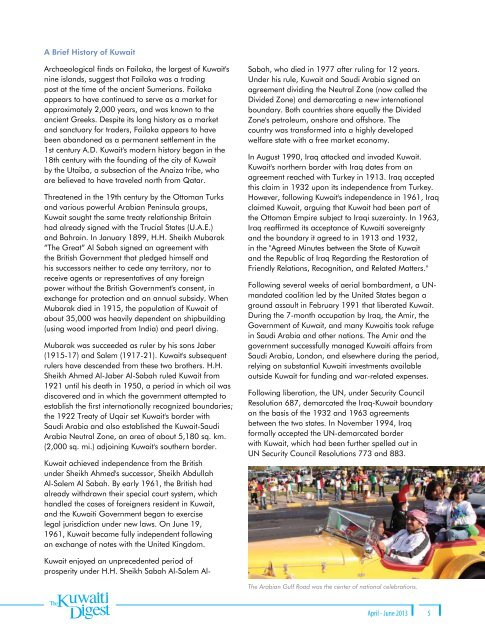6 - Kuwait Oil Company
6 - Kuwait Oil Company
6 - Kuwait Oil Company
You also want an ePaper? Increase the reach of your titles
YUMPU automatically turns print PDFs into web optimized ePapers that Google loves.
A Brief History of <strong>Kuwait</strong><br />
Archaeological finds on Failaka, the largest of <strong>Kuwait</strong>'s<br />
nine islands, suggest that Failaka was a trading<br />
post at the time of the ancient Sumerians. Failaka<br />
appears to have continued to serve as a market for<br />
approximately 2,000 years, and was known to the<br />
ancient Greeks. Despite its long history as a market<br />
and sanctuary for traders, Failaka appears to have<br />
been abandoned as a permanent settlement in the<br />
1st century A.D. <strong>Kuwait</strong>'s modern history began in the<br />
18th century with the founding of the city of <strong>Kuwait</strong><br />
by the Utaiba, a subsection of the Anaiza tribe, who<br />
are believed to have traveled north from Qatar.<br />
Threatened in the 19th century by the Ottoman Turks<br />
and various powerful Arabian Peninsula groups,<br />
<strong>Kuwait</strong> sought the same treaty relationship Britain<br />
had already signed with the Trucial States (U.A.E.)<br />
and Bahrain. In January 1899, H.H. Sheikh Mubarak<br />
“The Great” Al Sabah signed an agreement with<br />
the British Government that pledged himself and<br />
his successors neither to cede any territory, nor to<br />
receive agents or representatives of any foreign<br />
power without the British Government's consent, in<br />
exchange for protection and an annual subsidy. When<br />
Mubarak died in 1915, the population of <strong>Kuwait</strong> of<br />
about 35,000 was heavily dependent on shipbuilding<br />
(using wood imported from India) and pearl diving.<br />
Mubarak was succeeded as ruler by his sons Jaber<br />
(1915-17) and Salem (1917-21). <strong>Kuwait</strong>'s subsequent<br />
rulers have descended from these two brothers. H.H.<br />
Sheikh Ahmed Al-Jaber Al-Sabah ruled <strong>Kuwait</strong> from<br />
1921 until his death in 1950, a period in which oil was<br />
discovered and in which the government attempted to<br />
establish the first internationally recognized boundaries;<br />
the 1922 Treaty of Uqair set <strong>Kuwait</strong>'s border with<br />
Saudi Arabia and also established the <strong>Kuwait</strong>-Saudi<br />
Arabia Neutral Zone, an area of about 5,180 sq. km.<br />
(2,000 sq. mi.) adjoining <strong>Kuwait</strong>'s southern border.<br />
<strong>Kuwait</strong> achieved independence from the British<br />
under Sheikh Ahmed's successor, Sheikh Abdullah<br />
Al-Salem Al Sabah. By early 1961, the British had<br />
already withdrawn their special court system, which<br />
handled the cases of foreigners resident in <strong>Kuwait</strong>,<br />
and the <strong>Kuwait</strong>i Government began to exercise<br />
legal jurisdiction under new laws. On June 19,<br />
1961, <strong>Kuwait</strong> became fully independent following<br />
an exchange of notes with the United Kingdom.<br />
Sabah, who died in 1977 after ruling for 12 years.<br />
Under his rule, <strong>Kuwait</strong> and Saudi Arabia signed an<br />
agreement dividing the Neutral Zone (now called the<br />
Divided Zone) and demarcating a new international<br />
boundary. Both countries share equally the Divided<br />
Zone's petroleum, onshore and offshore. The<br />
country was transformed into a highly developed<br />
welfare state with a free market economy.<br />
In August 1990, Iraq attacked and invaded <strong>Kuwait</strong>.<br />
<strong>Kuwait</strong>'s northern border with Iraq dates from an<br />
agreement reached with Turkey in 1913. Iraq accepted<br />
this claim in 1932 upon its independence from Turkey.<br />
However, following <strong>Kuwait</strong>'s independence in 1961, Iraq<br />
claimed <strong>Kuwait</strong>, arguing that <strong>Kuwait</strong> had been part of<br />
the Ottoman Empire subject to Iraqi suzerainty. In 1963,<br />
Iraq reaffirmed its acceptance of <strong>Kuwait</strong>i sovereignty<br />
and the boundary it agreed to in 1913 and 1932,<br />
in the "Agreed Minutes between the State of <strong>Kuwait</strong><br />
and the Republic of Iraq Regarding the Restoration of<br />
Friendly Relations, Recognition, and Related Matters."<br />
Following several weeks of aerial bombardment, a UNmandated<br />
coalition led by the United States began a<br />
ground assault in February 1991 that liberated <strong>Kuwait</strong>.<br />
During the 7-month occupation by Iraq, the Amir, the<br />
Government of <strong>Kuwait</strong>, and many <strong>Kuwait</strong>is took refuge<br />
in Saudi Arabia and other nations. The Amir and the<br />
government successfully managed <strong>Kuwait</strong>i affairs from<br />
Saudi Arabia, London, and elsewhere during the period,<br />
relying on substantial <strong>Kuwait</strong>i investments available<br />
outside <strong>Kuwait</strong> for funding and war-related expenses.<br />
Following liberation, the UN, under Security Council<br />
Resolution 687, demarcated the Iraq-<strong>Kuwait</strong> boundary<br />
on the basis of the 1932 and 1963 agreements<br />
between the two states. In November 1994, Iraq<br />
formally accepted the UN-demarcated border<br />
with <strong>Kuwait</strong>, which had been further spelled out in<br />
UN Security Council Resolutions 773 and 883.<br />
<strong>Kuwait</strong> enjoyed an unprecedented period of<br />
prosperity under H.H. Sheikh Sabah Al-Salem Al-<br />
The Arabian Gulf Road was the center of national celebrations.<br />
April - June 2013 5

















